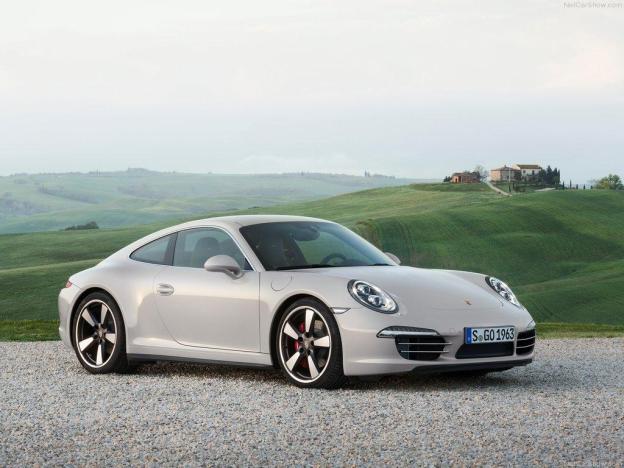 The Porsche 911 is celebrating the “Big 5-0” this year, and no automotive birthday is complete without a special edition.
The Porsche 911 is celebrating the “Big 5-0” this year, and no automotive birthday is complete without a special edition.
Porsche is bringing the heat this year with a redesigned 911 GT3 and 911 Turbo, but the awkwardly named 911 50 Years Edition is based on the tamer Carrera S. Only 1963 units will be sold worldwide, symbolizing the year of the car’s birth.
Immediately setting the 50 Years Edition apart from non-commemorative Carreras is the wider bodywork that’s usually found an all-wheel drive Carrera 4 models, along with 20-inch alloy wheels modeled on the classic Fuchs alloys that adorn many a vintage 911.
The interior gets a unique seat fabric meant to replicate the tartan seats of early 911s. The gauges, with their green dials, white needles, and silver pins, are also pretty retro. There’s also plenty of brushed aluminum trim.
So the 50 Years Edition looks special, but is it special where it counts?
Most special edition cars are all about decals and serial numbers, not performance. The 911 50 Years Edition isn’t exactly a racecar, but it does better than most.
For this car, Porsche re-calibrated the PASM (Porsche Active Stability Management) electronically-controlled suspension, and added a sport exhaust system. A limited-slip differential is also standard.
Still, performance statistics remain the same as a normal Carrera S. The 3.6-liter flat-six produces 400 horsepower, and can be mated to either a seven-speed manual transmission or PDK dual-clutch transmission.

So the 50 Years Edition is pretty fast, but no faster than a stock 911 Carrera S. It is well-equipped, though: in addition to all of the performance hardware, it comes with a navigation and infotainment system with 4.6-inch display.
Porsche is currently taking orders for the 911 50 Years Edition, with deliveries taking place later this year. The asking price is $141,300, but with only 1963 examples on offer, Porsche shouldn’t have any trouble finding each car a home with a sentimental collector.


